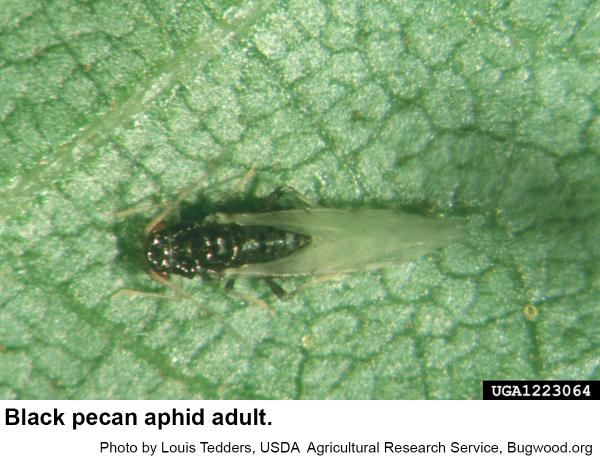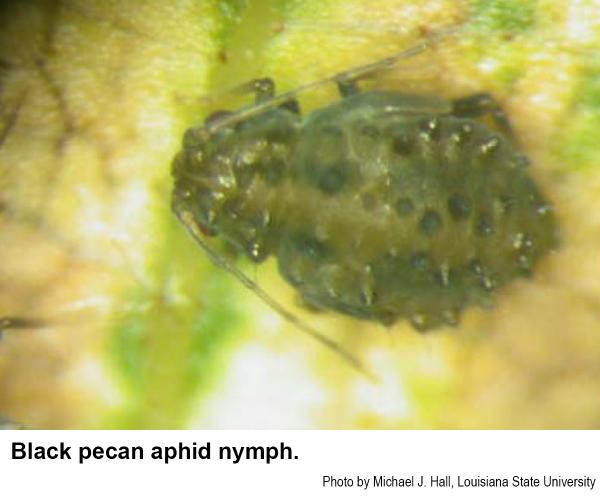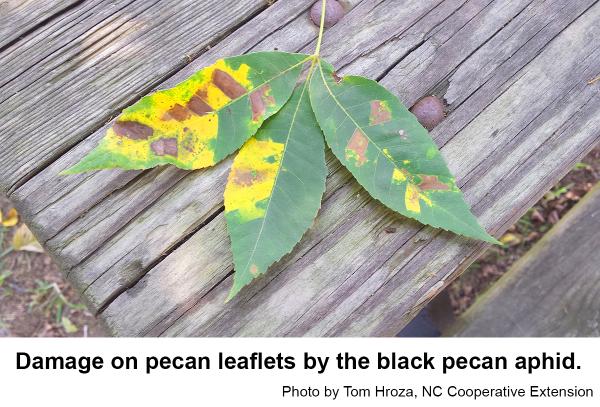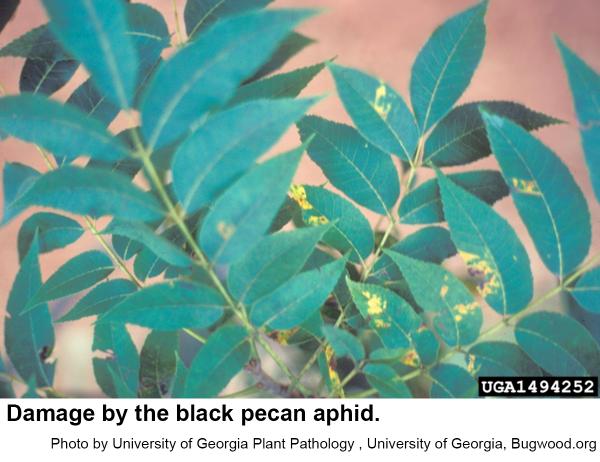Description and Biology
The black pecan aphid, Melanocallis caryaefoliae, is so called because the adult aphids are dark green to black and because they can be a damaging pest of pecan. The body is about ¾ as long as wide, so this is a stubby looking insect, and it is small (about 1/16 inch). There are a few knobs along each side of the abdomen, but the cornicles are not noticeable. Nymphs are pale to olive green with wide bodies. They have several knobs on the abdomen, but the cornicles are not pronounced. Nymphs develop into some adults that have wings or are wingless. The last generation in the fall lays eggs that do not hatch until spring. The new nymphs begin feeding on the new leaves with little noticeable damage. These nymphs mature into adult females that give birth to 35 or so live nymphs all of which develop into females. For 20 to 30 generations, only females develop. The last generation of nymphs in the fall develop into males and females that mate. Females then lay overwintering eggs. This aphid is reputed to not excrete honeydew.
Host Plants
Pecan is the primary host of the black pecan aphid. Yellow rectangular or multi-angular spots between the veins of the leaflets are sure signs of black pecan aphid feeding. These spots eventually turn brown and the leaflet may drop prematurely. Damage is slight in spring and early summer, but large populations later in the season can cause severe defoliation.
Residential Recommendations
The black pecan aphid is probably most damaging in commercial pecan groves where insecticides are applied to control twig girdlers or other insect pests. Such applications kill lady beetles, aphid lions, parasitic wasps, and other natural controls of aphids—freeing any remaining aphids to reproduce unimpeded. Pecan trees in residential yards are often too large to spray in a practical manner. If a tree is small enough to spray, consider using a horticultural oil as these oils are less damaging to predators and parasites of aphids.
References
- Aphids on Ornamental Landscape Plants. Steven Frank. 2009. Entomology Insect Notes, NC State Extension Publications.
- Black Pecan Aphid. Hall, M. J. 2010. Bug Biz, Pest Management and Insect Identification Series. LSU AgCenter. Pub. 3146.
- Important biological and morphological characteristics of the foliar-feeding aphids of pecan. Tedders, W. L. 1978. USDA Tech. Bull. 1579.
- Extension Plant Pathology Publications and Factsheets
- Horticultural Science Publications
- North Carolina Agricultural Chemicals Manual
For assistance with a specific problem, contact your local Cooperative Extension Center
This Factsheet has not been peer reviewed.
Publication date: May 13, 2016
Revised: Sept. 11, 2019
Recommendations for the use of agricultural chemicals are included in this publication as a convenience to the reader. The use of brand names and any mention or listing of commercial products or services in this publication does not imply endorsement by NC State University or N.C. A&T State University nor discrimination against similar products or services not mentioned. Individuals who use agricultural chemicals are responsible for ensuring that the intended use complies with current regulations and conforms to the product label. Be sure to obtain current information about usage regulations and examine a current product label before applying any chemical. For assistance, contact your local N.C. Cooperative Extension county center.
N.C. Cooperative Extension prohibits discrimination and harassment regardless of age, color, disability, family and marital status, gender identity, national origin, political beliefs, race, religion, sex (including pregnancy), sexual orientation and veteran status.




